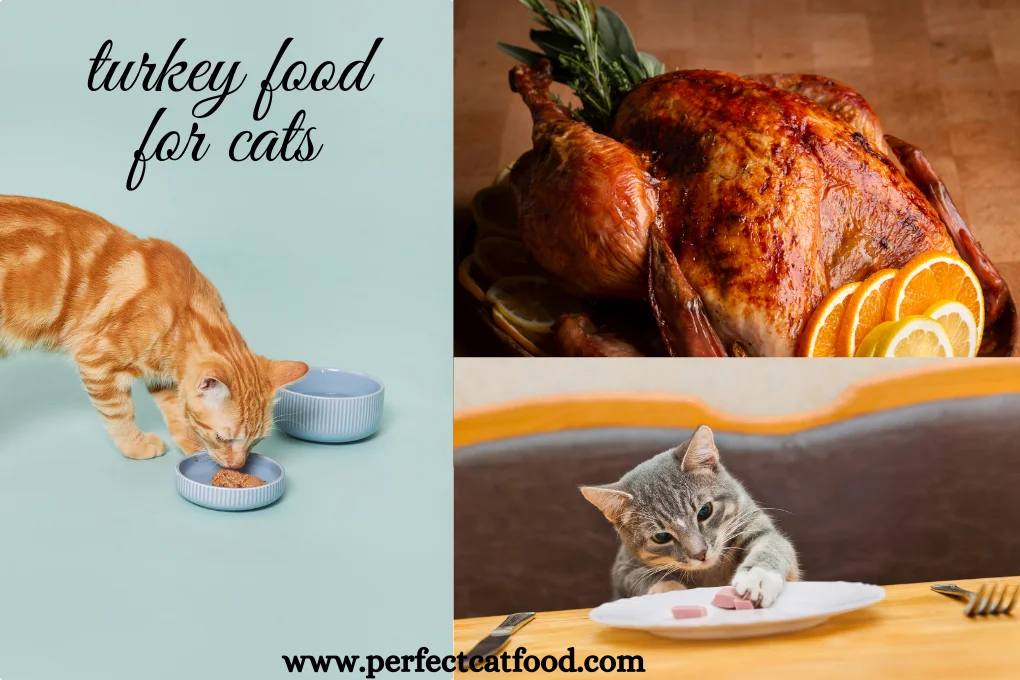I want to delve into a common question many cat owners ponder: “Is turkey good for cats?”
Cats have earned their place as cherished companions in countless households worldwide. Giving our feline companions a healthy, well-balanced diet is essential for responsible pet owners.
As a pet specialist, I’ll go over the nutritional aspects, advantages, possible drawbacks, and useful advice for feeding turkey to your cat in this post.
And let me know if I think your cat’s menu would be enhanced by this Thanksgiving favorite. Let’s embark on this tasty exploration together!
Table of Contents
Is Turkey Good For Cats?
Yes, when served in moderation, turkey can be a delightful treat for cats. Rich in lean protein, it aligns with a feline’s predatory nature.
I’ve found that turkey can be a healthy addition to your cat’s diet. It’s a good source of lean protein and essential nutrients.

However, moderation is key – avoid seasoning and ensure its boneless and cooked thoroughly.
As a cat food expert, I recommend incorporating small, cooked turkey bits into their diet for variety.
Always consult your vet to ensure it meets your cat’s specific nutritional needs. When giving your pet this delicious protein boost, keep in mind that balance is important.
Understanding a Cat’s Diet
Cats are obligate carnivores, meaning their diet primarily consists of meat. Proteins are pivotal in maintaining health, supporting muscle development, and sustaining energy levels.
It’s essential to understand the components of commercial cat food, often including meat by-products, grains, and additives.
Nutritional Benefits of Turkey for Cats
For our feline companions, turkey, a lean protein source, provides several nutritional advantages. Turkey is high in protein and a good B vitamins, iron, and zinc source.
Turkey can be a healthier addition to a cat’s diet than other meats.
Risks and Considerations
While turkey can be beneficial, cat owners must be aware of potential risks. Some cats may develop allergies to certain proteins, emphasizing the need for moderation and careful observation.
Additionally, seasoning and additives commonly found in human-prepared turkeys can harm cats.
Turkey as a Treat
Beyond regular meals, cat owners can consider incorporating turkey into treats.
From homemade options to store-bought alternatives, this section offers insights into providing tasty, nutritious rewards for your cat.
Why is turkey good for cats?
Turkey primarily benefits cats due to its high-quality protein content, which is essential for their muscle development and overall health.
As a pet food expert, I emphasize that turkey is a lean meat, aligning with a cat’s carnivorous diet. It provides vital amino acids, promoting a strong immune system and a glossy coat.
Additionally, turkey offers B vitamins like niacin and B6, contributing to energy metabolism. However, moderation is key, as excessive consumption can lead to digestive issues.
Always consult your vet to ensure turkey complements your cat’s dietary requirements. A well-balanced treat can enhance their nutritional profile.
Is turkey good for cats with sensitive stomachs?
Yes, turkey can be a gentle protein option for cats with sensitive stomachs. I recommend lean, cooked turkey without seasoning or skin. It’s digestibility and low fat content make it suitable for sensitive tummies.
However, it’s crucial to introduce new foods gradually and monitor your cat’s response. If unsure, consulting with a vet is wise to tailor the diet to your cat’s specific needs.
Remember, every feline is unique, and a cautious, personalized approach ensures that the introduction of turkey aligns seamlessly with your sensitive-stomached cat’s well-being.
Is turkey healthy for a cat?
Yes, turkey can be a healthy addition to a cat’s diet. Turkey is lean and aligns with a cat’s predatory nature. It provides important amino acids, supporting the immune system and coat health.
But it’s important to serve cooked, boneless turkey sparingly—no added ingredients or large servings.
Always consult with a vet to ensure it complements your cat’s specific nutritional needs.
When used in moderation, Turkey can provide your cat’s diet with an added nutritional boost.
Can cats eat turkey eggs?
Yes, cats can eat turkey eggs. Turkey eggs are safe for cats to consume, but ensuring they are fully cooked is essential.
Raw eggs may pose a risk of salmonella. While turkey eggs are not a common part of a cat’s diet, if your feline shows interest, you can offer them occasionally as a treat.
However, it’s crucial to introduce new foods slowly and monitor your cat for any adverse reactions.
As with any dietary changes, consulting with a veterinarian is recommended to ensure that turkey eggs align with your cat’s nutritional needs.
Is turkey wet food good for cats?
Yes, I find turkey-wet food to be a fantastic option for cats. I like how moisturizing it is because it is essential for staying hydrated.
The rich protein in turkey supports muscle health, and the wet texture aids cats who may be picky eaters or have dental issues.
However, checking labels for quality ingredients and avoiding additives are essential. Introducing variety into your cat’s diet is beneficial, and turkey-wet food is a tasty way to do so.
Health Benefits of Turkey to Cats
Turkey provides cats with some health benefits:
◉ Rich in Protein: Turkey is a great source of lean protein necessary for a cat’s general health and muscle growth.
◉ Amino Acids: They provide vital amino acids that contribute to a strong immune system and help maintain a shiny coat.
◉ Low in Fat: Turkey is generally low in fat, making it a suitable protein source for cats, particularly those with weight management considerations.
◉ B Vitamins: It contains vitamins like niacin and B6, supporting energy metabolism in cats.
◉ Palatability: Many cats find the taste of turkey appealing, making it an enticing option to encourage a healthy appetite.
As usual, moderation and a well-balanced diet are the secrets to enjoying these advantages without creating any nutritional imbalances.
How much Turkey is safe for cats?
Feeding turkey to cats should be done in moderation. As a cat owner, I recommend offering small amounts of cooked, plain, and boneless turkey.
A general guideline is to limit it to around 10% of their daily caloric intake. This helps prevent dietary imbalances and ensures they receive essential nutrients from their regular cat food.
Avoid seasoning, especially garlic and onions, as they can harm cats. Remove the skin and excess fat to prevent digestive issues.
Always monitor your cat for any adverse reactions when introducing new foods.
FAQs About Turkey and Cats
-
Can I feed my cat-cooked turkey from my Thanksgiving leftovers?
Yes, but ensure it’s boneless, skinless, and free from seasonings like garlic and onion.
-
Is ground turkey a suitable option for cats?
Absolutely, but it should be lean and cooked thoroughly to eliminate any bacterial risks.
-
How often can I include turkey in my cat’s diet?
Aim for moderation, incorporating turkey 2-3 times weekly to maintain a balanced diet.
-
Are there alternative protein sources to turkey for cats?
Yes, options like chicken and fish can be considered, ensuring a varied diet.
-
Can turkey trigger allergies in cats?
While rare, some cats may be allergic to turkey. Monitor your cat for any adverse reactions.
Conclusion
In answering the question, “Is Turkey Good For Cats?” the verdict is a resounding yes, with the caveat of mindful and moderated consumption.
Turkey is a protein-rich, nutrient-packed addition to your cat’s diet, contributing to their overall health and well-being.
While turkey can be a nutritious addition to a cat’s diet, it should be introduced cautiously and in consultation with a veterinarian.
Considering your cat’s needs and preferences is essential for maintaining their health and well-being.

Hi there! My name is Koushik; I am a cat lover. I specialize in writing about pet care & food. I have a wealth of knowledge on cat food niches and related subjects. I have worked in the pet industry for over 5 years and am passionate about helping cat owners provide the best care for their furry friends. With knowledge of cat food and nutrition, I aim to share their insights and help cat owners navigate the world of cat food niches. I enjoy playing with my two cats, reading, and exploring new cat food brands in my free time.